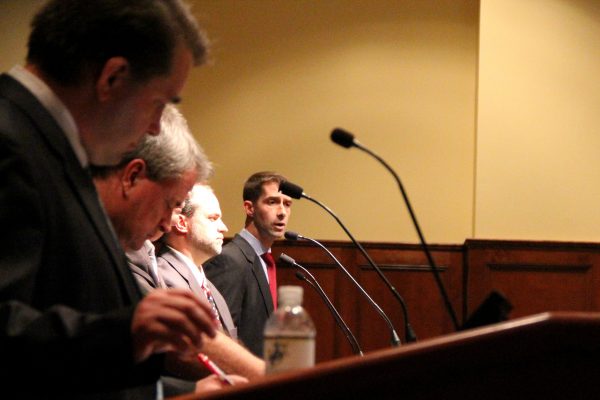We Must Rethink the Way We Debate
The ways in which we debate have changed drastically in recent years. (COURTESY OF SOUTHERN ARKANSAS UNIVERSITY/FLICKR)
October 2, 2017
If you find yourself tired of the political talking heads that seem to have hijacked cable television, you might turn to Netflix for some relief. If you find yourself questioning how we got to this point, I highly recommend visiting the documentaries section and watching “Best of Enemies.”
“Best of Enemies” is a documentary about a series of debates that took place during the 1968 Republican and Democratic conventions between William Buckley Jr. and Gore Vidal. If you watch you cannot help but notice the difference in how the media was then and how it is now. The conservative Buckley and liberal Vidal were some of the leading intellectuals of their time, debating the issues of their day but in a manner that seems foreign today. Although they debated, there was a sense of respect for the viewers as well as for intellectual and journalistic integrity. Watch almost any political commentary program on television today and you will find “experts” yelling over one another, resorting to personal attacks and looking to promote themselves rather than the issues at hand.
Something so simple yet impactful in the documentary, was how just a few words would change William Buckley Jr’s life. Known for being calm and collected as well as a fine debater, Buckley responded to Gore Vidal’s “crypto Nazi” label of him in an uncharacteristic way. Buckley would call Vidal a “queer” on television and threaten to hit him. This one incident would affect Buckley for the latter half of his life. Far worse has been said by journalists today as they go un-fazed. But Buckley’s regret goes to show how much the integrity of political discourse has declined in the last few decades. Where did political commentary go wrong, though? That is the question now.
In the past, there was a small handful of channels from which people could choose, usually news stations. These few news stations brought the people near objective news with quite little bias. The news wasn’t commercialized or as obsessed with entertainment as it is today, and the networks did not depend on corporations as they do now. People were shown news and events and had time to process this information to conclude what they believed.
As commercialization swept the media, there became hundreds of channels. With more sources suddenly came competition for ratings. To win the “ratings war,” entertainment made its way into our news, changing American television forever. The majority of our means of information today is advertisements, with very little time dedicated to actual reporting. Even the reporting has become dramatic, with news networks now leaving cliffhangers at the end of segments to make sure audiences stay tuned in.
In 2004, Jon Stewart was a guest on the CNN program “Crossfire,” where members of both parties came together around a table to discuss issues. Stewart famously called out both sides for causing division with their rhetoric. Soon after, the show was cancelled, but looking back I believe a show like that is needed today. Stewart was right for wanting to bridge the gap between the two sides, but the aftermath was hardly that. Instead of two sides coming together, news channels attached to their political ideologies and became more polarized. Today we scramble to find solutions to bring both sides to a table in order to have civil constructive discussions, like those of Buckley and Vidal’s. Politics has become so strongly partisan that we’ve forgotten the essence of each side and what it stands for, as we spend the majority of time we would otherwise have for discourse attacking one another. If we truly want to move America forward, we need to remember the days of respectful debate and how to lay out the issues constructively to find solutions. Until then, both sides will remain the best of enemies.












